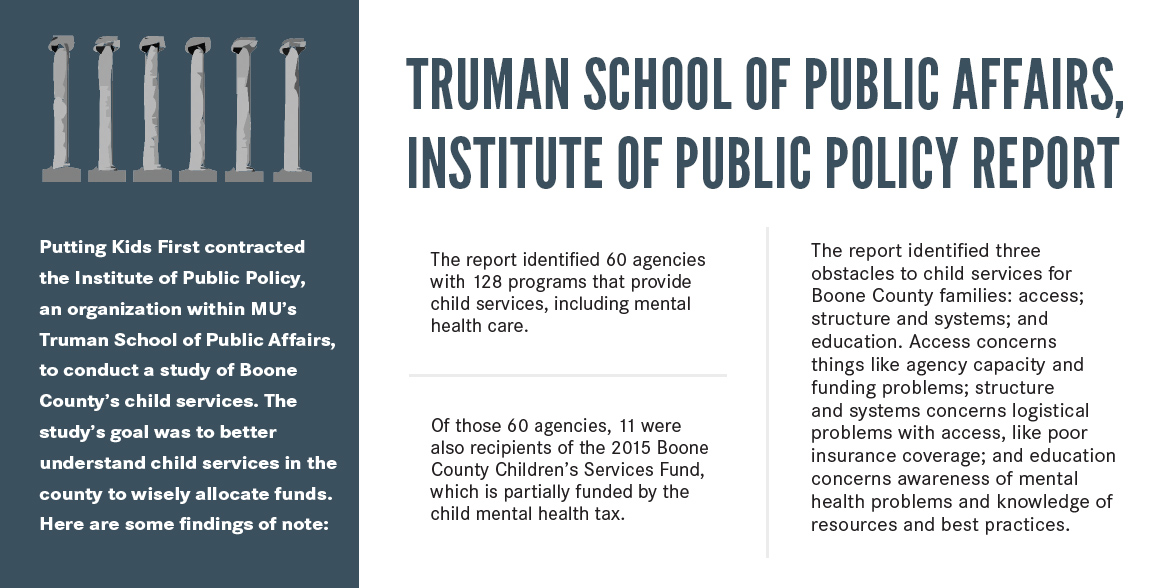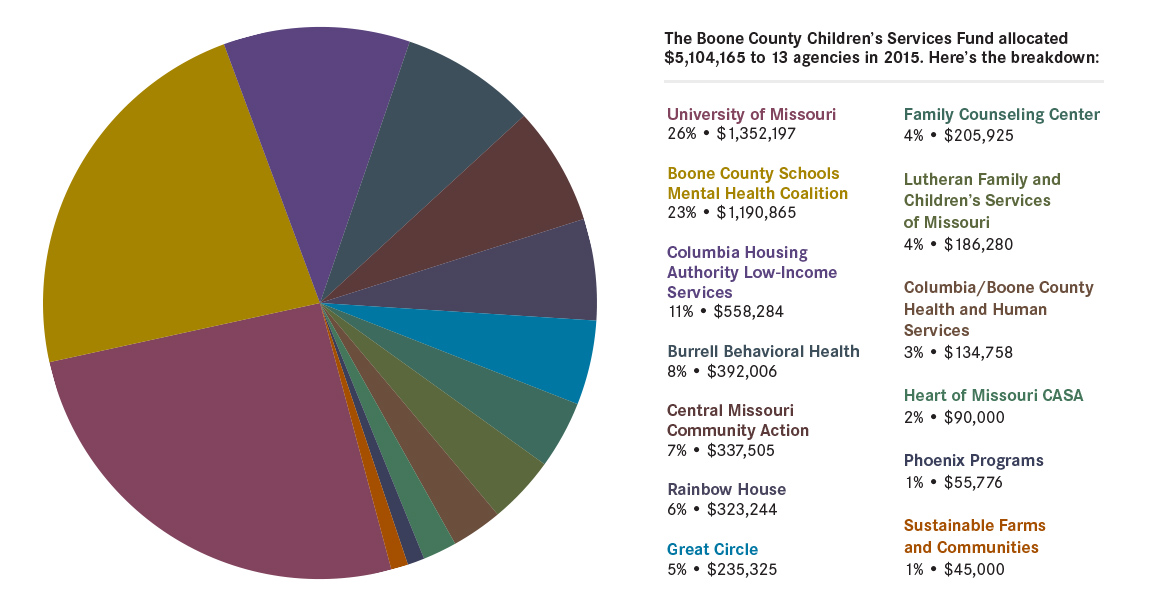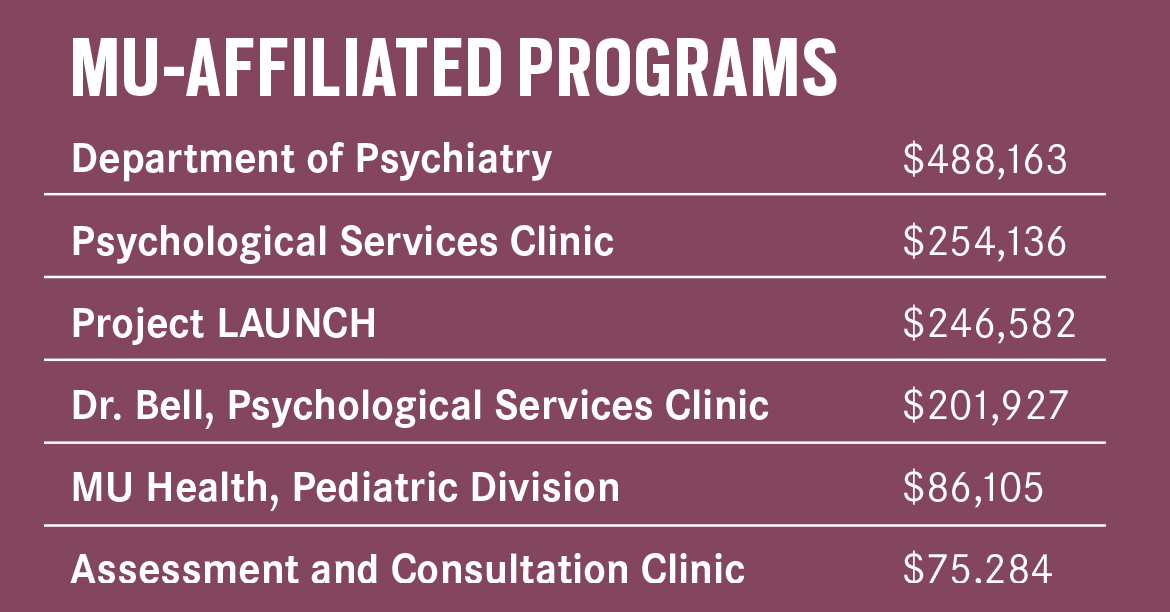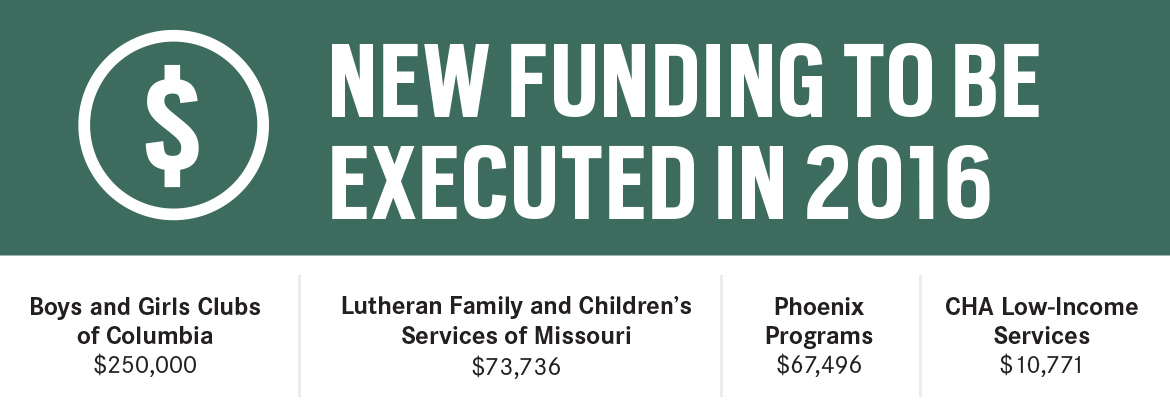Funding Mental Health

A look at the first three years of Boone County’s childhood mental health tax.
Five years ago, a group of social service agencies began meeting to discuss the needs of the children and families in Boone County. As the providers of many of Boone County’s mental health services, the group had a general idea of the county’s needs, but past attempts at publicly funded support for childhood mental health had been unsuccessful.
Their coalition, named Putting Kids First, was comprised of representatives from Lutheran Family and Children’s Services, Children’s Foundation of Mid-America, Pathways Community Health, Burrell Behavioral Health and Great Circle (formerly Boys and Girls Town). Putting Kids First funded the campaign to get a child mental health tax on the November 2012 county ballot. Calling for a quarter cent sales tax increase in perpetuity, this measure was estimated to bring in $5.4 million per year for area mental health agencies.
The 2012 ballot marked the third attempt to pass the tax, which voters voted down in 2007 and 1994.
“There wasn’t an opposition — it was really more of an apathy,” says Anita Kiessling-Caver, who worked for Presbyterian Children’s Homes and Services at the time and was a committee member of Putting Kids First. She is currently the principal of Kiessling and Associates Psychological Group. “We had to do some education to get it on the ballot,” she says.
Putting Kids First targeted key members of Boone County. They set up community meetings, hired political consultant firms for neighborhood mailing campaigns, and contracted with the Institute of Public Policy, at the MU Truman School of Public Affairs, to study specific needs of the county. The tax passed in 2012, with 57 percent of votes. So what changed in the five years between 2007 and 2012?

“A lot of people didn’t feel that mental health issues are real,” says Keesling-Caver. “If we could communicate these facts, we could convince people to care about mental health for children. There’s a lack of understanding of the reality about mental illness issues.”
Revenues collected from this tax are put into the children’s services fund, which is managed by a board of nine Boone County citizens whose mission is to strategically invest in services for children and families in need.
The board reviewed 58 bids for program funding and accepted 23. By the end of January 2015, the board had awarded $5.1 million in contracts for services. Funding was provided either for 12 to 18 months, with an option for two 12-month renewals. All programs set to expire in 2016 were renewed, and new funding was allocated for four agencies.
Of the $5.1 million allocated for the 2015 contracts, roughly half was distributed to programs with MU affiliations. From this, almost $1.2 million was awarded to Dr. Wendy Reinke, an associate professor at MU who specializes in early childhood education and mental health, on behalf of the Boone County Schools Mental Health Coalition. When the sales tax was passed, Reinke was consulted by a group of Boone County superintendents.


“In discussion with them, we did a needs assessment across six districts,” Reinke says. “They were lacking the infrastructure and capacity to provide good treatments.”
Much of Reinke’s program is based around educating teachers and faculty about mental health and training them to utilize best practices in the classroom. “We’re training teachers on how to support children.” Reinke says. “Where there was no systematic way to identify students before, now teachers will be able to rate students based on mental health indicators.”
According to Reinke, trainings help teachers gauge the mental health of their students based on key indicators. Three times per year, teachers are expected to submit data on their students. From this data, mental health professionals are able to tailor their methods to specific groups of students.

“We try to give the teachers tools,” Reinke says. “Things that are done in the classroom can impact kids who have depression, anxiety or other mental health issues.”
While this is the program’s first year in Boone County schools, Reinke notes that they have already seen enthusiasm from teachers and faculty, particularly in areas of Boone County that went unserved before. “Harrisburg had nobody, and they are so excited about having a regional director to help them out,” she says.

The Coalition’s upward trajectory continues to have support from the Children’s Services Fund, driven by the tax passed in 2012.
“This is a very unique model that we don’t have the opportunity to implement in many places.” Reinke says. “This model is going to be good for communities throughout the nation, and without the tax, this wouldn’t be able to happen.”


